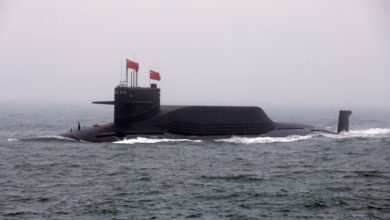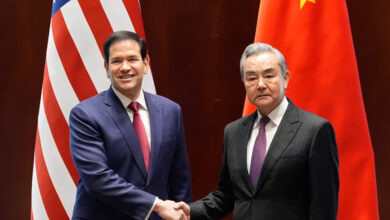
The mail today brought my much-anticipated copy of “Leadership,” the newest volume of wisdom from that eldest of elder statesmen, Henry Kissinger. In elegant yet no-nonsense prose, the former US secretary of state, who a half-century ago served Presidents Nixon and Ford, gives us six studies in world strategy that will be studied for years to come.
I was sitting having breakfast at the Churchill Hotel in Portman Square in London as I was attending a board meeting at 10 am across the square.
As I finished my English breakfast of tea and plain omelette with brown toast, I looked at the book’s index. An old-fashioned reader, I appreciate holding, reading, and marking a book. No Kindles or audiobooks for me, thank you.
There at the Churchill Hotel, I found the chapter on the late President Sadat of Egypt and began reading. I glanced at my watch. It was about 9:30 a.m. and the Churchill’s breakfast room was filling rapidly with families and business travellers. The waiters were busy seating them and taking their orders. I waved and moments later a waiter arrived with the credit card machine. I paid, thanked him, and left a cash tip.
Walking out of the lobby with my portfolio and the Kissinger book, I nearly bumped into a dear friend from Singapore, Lee King, a distinguished diplomat, an academic and geopolitical analyst, is the top expert on Asia — its politics, challenges, and global positioning. Lee serves on the same board and we walked together across the square to the Shell building, where the meeting was taking place on the third floor leased to the Institute for Global Economics and Geopolitical Studies (IGEGS).
We arrived sharply on time and were met by Sylvia, the efficient and extremely hands-on, 24/7 Secretary General of IGEGS. Sylvia was British, born in France, and had a previous career living in China and the US. She greeted us warmly and took us to the conference room, where all the board members who could attend were present because Zoom and other remote devices were prohibited by the IGEGS constitution. All board members were urged to attend, in person, four meetings a year in London, Washington D.C., Cairo, and Singapore.
Michael Barton, Chairman of IGEGS, greeted us. Mike, as he was known, was British, served in the military, and sat on the board of many British companies. As usual, he came attired in a dark grey striped suit, an Oxford tie, a white shirt, and gold cufflinks that he usually wore with a crest I could never decipher.
It was customary that we meet an hour before the board meeting. This allowed for the arrival of latecomers as all board members liked to interact personally face to face and mingle before the official board meeting began.
In the room were Jason Berkley, the famous American venture capitalist who flew from Silicon Valley, and Nermine Sertar, a well-known Turkish military analyst who advised numerous Turkish governments. In an earlier career, she headed a Turkish think tank.
Chatting near a long table with food and drinks was Diego Pastrana, a Colombian politician and writer who has served as his country’s representative in several global institutions. Alongside him was Javier Lopez, a Spaniard from Bilbao, an economist and a global circuit speaker in demand because of his contrarian and surprising views.
Whereas Diego was dapper in a loud blue suit with a pink shirt and a blue and pink bow tie, Javier was quite the opposite – in a pair of jeans, sneakers, a dishevelled striped shirt, and a non-descript jacket. Javier had a grey and white stubble and looked as if he had not slept for a while.
Our final board member walked in, Li Wang from China, accompanied as always by his trusted and strikingly attractive personal assistant, Jia Feng. Wang subdued himself in a grey suit and a solid white shirt with a striped grey and white tie. Feng, following him a step behind on the left, as always, wore her long hair in a bun, heels an inch shorter than Wang, and an appropriately professional navy suit with a white blouse tied at the neck in a large knot.
Wang and Michael greeted each other and walked around the room exchanging pleasantries with everyone. Michael was like a butterfly going fast among all the board members, Wang a calm in-depth person walking around slowly with Jia in tow, catching up with everyone.
Wang approached me last. Noticing Kissinger’s book in my hand, he asked me cordially, “Why this book by Henry now?”
I said: “Whilst I am not privy to the actual reason, my educated guess is a book by Kissinger entitled ‘Leadership’ at this very time was very appropriate as the world is devoid of leadership and frankly run by kakistocracies.”
“Xi Jinping is doing a great job,” Wang retorted.
I replied : “Whilst I do not know very much about China, I see Covid poorly mishandled, the economy slowing, entrepreneurs like Jack Ma curtailed because he dared speak out, and an extremely horrible way of treating Uyghur Muslims.”
One after another, all the other board members slowly gathered around us, the coffee and tea stand beckoning along with the conversation.
Javier heard my comment about China and contributed : “China is not doing well, but all the world except the Gulf is doing badly. Even the U.S. economy is contracting for the second quarter but it is isolated and therefore far from the forthcoming recession (if not something worse than a recession).”
Diego added: “Latin America is leaderless and feels the calm before the storm.”
Nermine interjected as she poured coffee in a mug and grabbed a piece of banana cake: “Are you forgetting the impact of three factors? Pandemic not over, Ukraine war and sanctions disrupting the economy, and geopolitics.”
Lee King, short but with a presence, asked: “Is this all because of poor leadership?”
Michael responded: “Whilst leadership is weak and not fit for today and definitely not tomorrow, this is a key issue for IGEGS, which we will discuss today as it is on the agenda and that is ‘prediction analytics.’ -” Without this capability and with no precision,” he added, “leaders make knee-jerk decisions and the world pays the price.”
Jia was taking notes on her mini-iPad as Sylvia looked at her watch and the agenda.
Wang calmly asked for a cappuccino from the server, then turned to us and said: “Michael’s comments are correct, but do not forget a key factor since the fall of the Berlin Wall. The US wanted to impose its own rules-based world order upon the world.
“Not only that,” Wang said, “but the U.S. also gives itself the right to break that world order it imposes when it wants, as it did in Iraq as an example.”
Jason responded to Wang: “This is a war between democracies and autocracies.”
Wang, sipping his coffee, said: “And you will add, between liberty and repression, as your President Biden has said in Warsaw. None of this is a fact. America is a republic and not a democracy.
“And remember,” he added, “President Biden also referred in Warsaw to that conflict between a rules-based order and one governed by brute force (comparing America and Russia), but note, how does that mesh with Vietnam, Iraq, Afghanistan etc?”
Diego stepped closer to the centre of the group: “Why can there not be an agreed ‘ rules-based’ order based on common sense, with a globally strengthened UN? Each country can have its internal culture, governing process, order, political system, and economic platform?”
Nermine responded: “Sounds good, but impossible to action.”
I raised Kissinger’s book and said: “That is why this is important. Remember, Nixon and Kissinger approaching China, Lee Kuan Yew turning a swamp into a leading nation, Thatcher with the eyes of Caligula roused the sick men of Europe, shaking her nation into vigour, and Sadat who did the impossible — war and a peace that has been the cornerstone of stability in the Middle East.”
Lee said: “Allow me to remind you what Lee Kuan Yew said – ‘A nation is great, not by its size, but by the discipline of its people and quality of leaders.’”
“I remember,” Michael said, looking at me, “you are a great admirer of Sadat and you lobbied the American Congress to secure a gold medal in Sadat’s honour.”
I nodded : “I believe that Sadat was a leader way ahead of his time with a vision, courage, and a persistent and strong manner of execution. Every Egyptian and Israeli owes him a debt. He paid for his visionary leadership with his life.”
Sylvia looked again at her watch and whispered to Jia. I glimpsed at my watch. It was ten minutes to 11 a.m. I asked for a cold iced tea. I felt parched.
Wang, putting his cup back on the table, said: “Whereas America emerged triumphant from the Cold War, it rapidly squandered the extraordinary opportunity to turn its unipolar moment and bring the family of nations together.”
Nermine continued Wang’s thought: “America overplayed its hand, believing it is the world’s indisputable power, and started a series of overt military and covert interventions launched in the name of stability and democracy, often producing more chaos and misery rather than stability and security.
“Do remember that Washington ignored its own rules intervening in Kosovo in 1999 and Iraq in 2003, not to mention Abu Ghraib and the so-called Arab Spring, Afghanistan, and more.”
Michael turned to Nermine: “America had nothing to do with the Arab Spring!”
Nermine surprisingly winked at Michael with a broad smile and said: “Do you remember Mohammed Mossadegh?” Michaels’s face reflected concern.
Nermine continued: “You do remember what MI6 and the CIA did to overthrow the democratically elected Mossadegh? ”
Sylvia tried to catch Michael’s attention by pointing to her watch, but he ignored her and said: “Great power competition will remain between America, China, and Russia.”
Diego moved to the board table, turned and said: “Also, don’t forget about the medium and small-sized power competition. India, Pakistan, Egypt, Ethiopia, North and South Korea and many more.”
He walked away.
That is why I said: “Prediction analysis is key in the world we live in today with the fast pace of change and multiple black swans coupled with the lack of leadership.”
Michael responded: “If Shafik is right, we need capable data mining coupled with the predictive capability to forecast risks, political and economic, and provide leaders with alternative paths and their global repercussions.”
He raised his hand and said: “We need to move to start our board meeting and start the agenda.”
We all shuffled to the large oak board table, all of us taking our predetermined seats, with Jia sitting behind Wang to the left. It was a sombre moment, full of harsh reality checks as Michael kicked off the meeting.
About the author
M. Shafik Gabr is a renowned leader in international business, innovation, investment and one of the world’s premier collectors of Orientalist art, and an accomplished philanthropist.
During his career, Gabr established over 25 companies plus three investment holding companies including ARTOC Group for Investment and Development which, established in 1971, is a multi-disciplined investment holding company with businesses in infrastructure, automotive, engineering, construction and real estate, over the past three years focusing on investment in technology and artificial intelligence.
Gabr is the Chairman and a founding member of Egypt’s International Economic Forum, a member of the International Business Council of the World Economic Forum, a Board Member of Stanhope Capital, an International Chairman of the Sadat Congressional Gold Medal Committee, and a Member of the Parliamentary Intelligence Security Forum. Gabr is a Member of the Metropolitan Museum’s International Council and serves on the Advisory Board of the Center for Financial Stability, the Advisory Board of The Middle East Institute, and the Global Advisory Council of the Mayo Clinic.
Through the Shafik Gabr Social Development Foundation, Gabr is helping to improve elementary-school education in Egypt, introducing students to arts and culture and promoting sports and physical fitness for youth. The Foundation has its first Medical and Social Development Center in Mokattam, Cairo, offering free medical and health services. In 2012 Gabr established in the US the Shafik Gabr Foundation which supports educational and medical initiatives plus launched in November 2012 the ‘East-West: The Art of Dialogue initiative promoting exchanges between the US and Egypt with the purpose of cultural dialogue and bridge-building.
Gabr holds a BA in Economics and Management from the American University in Cairo and an MA in Economics from the University of London.




